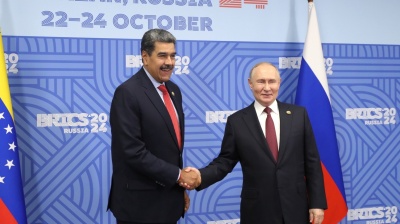Chechen President Ramzan Kadyrov, who is close to Russia's President Vladimir Putin, has been accused of attempting to bribe the leaders of Montenegro’s Bosniak party to back the pro-Russian opposition Democratic Front (DF) in its efforts to form a government after the October 2016 general election in Montenegro, Izvestia.ru revealed on November 29.
The DF is at the centre of the scandal over an alleged coup attempt ahead of the election. Two of its leaders are due to stand trial on suspicion of helping to plot the coup, which would have seen the DF seize power on election day with the help of Russian intelligence agents and Serb paramilitaries.
Kadyrov has not been linked to the plot, but his links to the DF surfaced in a letter to Russia’s Foreign Affairs Minister Sergei Lavrov from DF leaders Andrija Mandic and Milan Knezevic, both of whom have been stripped of their parliamentary immunity to allow the coup investigation to go ahead. The pair appealed for Russian support to help prove their innocence and mentioned that Kadyrov’s name had been included in the prosecution’s documentation, according to Izvestia.ru. The letter gave no further details as to what prosecutors had written about the Chechen president.
However, a few days earlier the key witness for the prosecution, Sasa Sindjelic, mentioned the name of the Chechen leader in relation to an alleged attempt to bribe the Bosniak party.
Sindjelic claimed that Kadyrov wanted to send money to the Bosnian party via Montenegro’s mufti in an attempt to persuade the party, which traditionally supports the long-ruling Democratic Party of Socialists (DPS), to give up joining the ruling coalition post-election and provide the DF and other opposition parties with two much needed MPs.
Had the Bosniaks switched sides, the DPS would have been unable to form a new government. It won 36 seats in the 81-seat parliament and needed support from all its traditional coalition partners – the four MPs representing ethnic minorities and the Social Democrats. During the negotiations, the Bosniak party seemed uncertain and some of its members indicated that it could indeed back the opposition instead. However, the DPS managed to bring the party back onside by giving it two ministerial seats.
The DPS has been in power in Montenegro since the country became independent in 2006. Its leader Milo Djukanovic has been either president or prime minister until he stepped down in 2016.
The suspected coup plotters are believed to have been planning to forcibly remove the DPS from power and either arrest or assassinate Djukanovic. 20 Serbian paramilitaries, led by former Serbian police commander Bratislav Dikic were arrested on the night of October 15 on suspicion of planning to disrupt the general election the next day. Most of them agreed to testify in exchange for shorter jail sentences.
The trial of those suspected of involvement in the plot, dubbed the “trial of the century” started on September 6 with Dikic’s hearing.
Prosecutors say Mandic and Knezevic, plus two Russians, were involved in the plot alongside the Serbs. They have accused the two Russians – Eduard Sirokov and Vladimir Popov – of organising the plot. Sirokov was also accused of “preparing acts against the constitutional order and security of Montenegro through incitement” and terrorism. This was backed up by Sindjelic, who said at his hearing that Sirokov had hired him to help the DF to seize power and provoke clashes on the night of October 16.According to earlier media reports, the prosecution has discovered that Sirokov is a member of the Russian security services.
News

Ukraine’s elite HUR forces turn the tide in the battle for Pokrovsk, as Russia’s effort to capture key logistics hub fails
The battle for Pokrovsk became intense early on November 1and it looked like the fall of the key logistics hub to Russia was imminent. But a bold counterattack by Ukraine’s elite HUR forces seems to have turned the tide.

US prepares attack on Venezuela as Maduro begs Putin for aid
The Trump administration has reportedly drawn up a list of potential military targets within Venezuela as part of its intensifying pressure on President Nicolás Maduro, who has turned to Moscow seeking urgent military assistance.

Bulgaria suspends fuel exports to EU after US sanctions Lukoil
Bulgaria has temporarily suspended exports of petroleum products to European Union countries after the United States imposed sanctions on Russian oil giant Lukoil.

Tens of thousands rally in Serbia's Novi Sad one year after deadly station collapse
Tragedy that killed 16 people has become a symbol of public anger over corruption and negligence, fueling Serbia’s largest protest movement in more than a decade.




